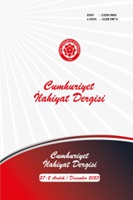Furkân Sûresinin 30. Âyetine Dair Müfessirlerin Yaklaşımları ve Hz. Peygamber’in Allah’a Münâcâtının Makâsıdî Tefsir Açısından Yorumu
The Approaches of Exegetes Regarding the 30th Verse of the Surah al-Furqān and the Interpretation of Prophet Mohammed’s Supplication/Complaint to God in Terms of the Method of Maqāsidī Tafsir
Author(s): Zakir DemirSubject(s): History of Islam, Sociology of Religion, History of Religion, Qur’anic studies
Published by: Cumhuriyet Üniversitesi İlahyat Fakültesi
Keywords: Tafsir (Qur’ānic Exegesis); Divine Quotations; the Complaint of Prophet Mohammed; the Neglect of the Qur’ān; the Principle of Teleological Interpretation;
Summary/Abstract: One of the divine quotations narrated from the timeline of Qur’ānic revelation is seen as a word of Prophet Mohammad in the 30th verse of the surah of al-Furqān. It’s observed that the speaker of this verse is Prophet Mohammad and he complains to God about his tribe which neglects the Qur’ān. In the present study, semantic structure and the meaning area of the phrase “mahjūr”, which is the key word in this verse, the meaning of it in the timeline of Qur’ānic revelation and the interpretations attributed to it in the following centuries are traced. Likewise by examining Qur’ānic exegesis chronologically and investigating the interpretations of the exegetes on the relevant verse, it’s tried to see the semantic breaking points, changes and transformations regarding this verse in the historical process. Finally, the approaches of the exegetes who interpreted this verse in terms of the method of maqāsidī tafsir or the principle of teleological interpretation are determined. The approaches detected in this respect are first explained in a descriptive style, and then they’re evaluated in an analytical point of view. The findings and conclusions we reached in this study are as follows: As stated by the majority of exegetes, especially Qatāda, al-Zamakhsharī, Ibn Atiyya, Fakhr al-Dīn al-Rāzī and al-Sa‘ālibī, the aforementioned verse belongs to the Prophet Mohammed in terms of both wording and meaning. It hasn’t been determined that there’s a conflict about the pertaining of this word to him. According to this hadith quoted in surah al-Furqān, the Qurayshi polytheists made unwarranted objections to the Prophet and the divine instructions that he brought, his heart was narrowed in the face of their attitude towards the Qur’ān, and for these reasons he complained about his tribe to God. It can be said that this meaning seen in Mecca in the tenth year of his prophethood, namely, insulting the Qur’ān, abandoning it, and denying the themes in it, also includes Muslims after the revelation period. Accordingly, it can be thought that the aspect and situation of not acting on the provisions of the Qur’ān and not thinking about its verses are also valid for the interlocutors of the next period. In this direction, when we look at the history of tafsir, it has been determined that the exegetes who interpreted this verse in terms of teleological interpretation asserted different approaches. It was seen that al-Zamakhsharī, al-Rāzī, Abū al-Barakāt al-Nasafī, al-Bikā‘ī, Kamālpasazāde, Sayhzāda and Ibn ʻĀshūr interpreted this complaint of the Prophet by associating it with the coming of punishment. Therefore, in compliance with them, this verse aimed to threaten all the interlocutors, especially the Quraysh. On the other hand, it has recognized that Ibn al-Qayyim al-Jawziyah, Ibn Kathir, Bursavī and Sayyid Qutb evaluated this verse in the context of the types and ways to abandon the Qur’ān. Thus, they interpreted the relevant verse in terms of maqāsidī tafsir in a way that would cover both the first addressees of Qur’ānic revelation and other interlocutors in the following periods. In a nutshell, it can be considered that not endeavoring to understand and interpret the Qur’ān, or keeping it away from family and social life, law, understanding of earning and spending, not referring to it in such matters, or giving up living a life pursuant to it, are some of the routes and sorts of abandonment of it for Muslims.
Journal: Cumhuriyet İlahiyat Dergisi
- Issue Year: 27/2023
- Issue No: 2
- Page Range: 592-618
- Page Count: 27
- Language: Turkish

